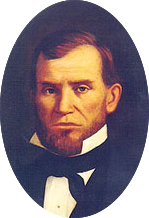Hardin Richard Runnels
| Hardin Richard Runnels | |
|---|---|
 |
|
| 6th Governor of Texas | |
|
In office December 21, 1857 – December 21, 1859 |
|
| Lieutenant | Francis R. Lubbock |
| Preceded by | Elisha M. Pease |
| Succeeded by | Sam Houston |
| 5th Lieutenant Governor of Texas | |
|
In office 1855–1857 |
|
| Governor | Elisha M. Pease |
| Preceded by | David Catchings Dickson |
| Succeeded by | Francis R. Lubbock |
| Member of the Texas House of Representatives | |
|
In office 1847-1855 |
|
| Personal details | |
| Born |
August 30, 1820 Mississippi |
| Died | December 25, 1873 (aged 53) Bowie County, Texas |
| Political party | Democratic |
| Profession | Politician |
Hardin Richard Runnels (August 30, 1820 – December 25, 1873) was a U.S. political figure. Runnels served as the sixth Governor of Texas, for only one term, but notably was the only person to ever defeat Sam Houston in a political contest.
Runnels was born to Hardin D. and Martha "Patsy" Burch (Darden) Runnels on August 30, 1820 in Mississippi. His father died in 1842 and his mother moved the family to Texas the same year. There Runnels established a cotton plantation in Bowie County along the Red River.
Elected to represent Bowie county in the Texas House of Representatives in 1847, Runnels remained a member of the state legislature through 1854. During his final session, he was Speaker of the Texas House. Runnels was elected Lieutenant Governor of Texas in 1855, serving in this capacity during Governor Elisha M. Pease's second term. During his time in the legislature and as Lieutenant Governor he gained a reputation as a loyal member of the Democratic Party and an advocate for states' rights.
When the Democratic Party held its first convention in Texas in May 1857, Runnels attended as a delegate.Sam Houston had upset many voters with his pro-Union position, association with the Know Nothings during 1855, and his vote against the Kansas–Nebraska Act. As a result party leaders blocked Houston's nomination for governor and Runnels was selected instead. Houston, sensing he was unlikely to be reappointed to the U.S. Senate, announced he was running for governor as an independent on May 12, 1857. While states' rights were nominally the primary issue, the resulting campaign quickly became a contest of personalities. Voter anger over Houston's recent political positions continued until election day and Runnels became the only person to defeat Houston in an election by a vote of 38,552 to 23,628.
...
Wikipedia
